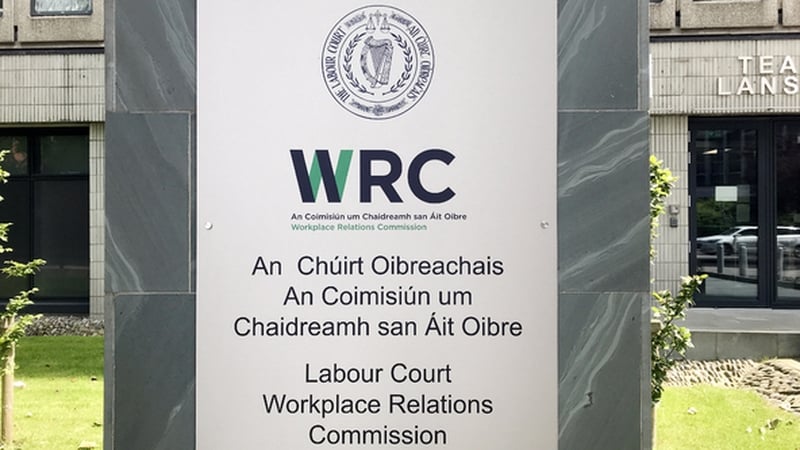A takeaway boss has been accused of “violating and exploiting” a migrant worker for two years by putting him to work for up to 73 hours a week and docking tens of thousands of euro from his wages to pay off €30,000 in alleged “recruitment fees”, the WRC has heard.
Under questioning at the Workplace Relations Commission (WRC) today, the businessman’s wife – the only witness to testify in response to the worker’s multiple employment rights complaints – said: “Ask my accountant; I only know how to cook curry chicken.”
The claimant, Chinese national Xiaofeng Gao (41), is seeking back pay and compensation for multiple alleged breaches of his employment rights while employed as chef de partie at Lam’s Asian Cuisine and Eskimo Pizza, Main Street, Ballyjamesduff, Co Cavan between 1 August 2022 to 6 August 2024, when he quit.
A Migrant Rights Centre of Ireland (MRCI) advocate, Pretty Ndawo, who appeared for Xiaofeng Gao, told the WRC that her client came to Ireland in July 2022 after signing a promissory note in China agreeing to pay”recruitment fees” amounting to around €31,000 to businessman, Ming Gao.
It was on condition that her client “had to stay under Ming Gao’s employment for five years to pay back the recruitment fees”, with the terms of the promissory note stipulating deductions of hundreds of euro a week from his wages, Ms Ndawo added.
Such deductions were in breach of the Employment Permits Act and left her client earning well below the minimum wage when the claimant’s “excessive” working hours were taken into consideration, despite his employment permits requiring higher rates of pay, she submitted.
Barrister Donna Reilly BL told the tribunal said she was representing the businessman, but not the limited company run by the couple, She submitted that the alleged “recruitment fees” were actually a loan from Ming Gao’s mother – and that the worker is still in debt to her. That was denied by the claimant.
The WRC heard that initially, the chef worked directly for Ming Gao while the businessman ran the restaurant as a sole trader. He was later transferred to Eskimo Gao Ming Ltd, a limited liability company where Ming Gao was company director and his wife, Xiuqin Wu, was company secretary.
Ms Reilly sought had sought an adjournment of the case. “He’s unable to attend due to stress, effectively,” she said of Ming Gao.
Adjudicator Shay Henry refused the application and spent nearly ten hours hearing the case on Tuesday and Wednesday.
Ms Ndawo submitted that her client was “severely afraid” of the businessman and had been told “if he didn’t pay off his debt from the recruitment fees that something bad would happen to his family and himself”.
Giving evidence through a Mandarin interpreter, Xiaofeng Gao said he lived above the restaurant and worked six days a week, and sometimes seven. “My working hours were: Monday to Thursday, 2pm to 12 [midnight]; Friday to Sunday my working time was 2pm to 1am, and [I] sometimes worked overtime. It could reach over 70 hours for some of the weeks,” he said.
“I hardly have time to take breaks, even for my lunch,” he said.
He said his wages came weekly in cash from August to May 2023, reduced by a sum going towards the alleged recruitment fees. After May 2023, he said, he received payment by bank transfers, but was “required to transfer the money back to his [Ming Gao’s] wife’s WePay account”.
He said that on one occasion in July 2023, he received a bank transfer for €10,000 from the businessman to his Irish account. “I was requested to transfer this money in Chinese ren back to China, back to my employer, Ming Gao’s, mother”, he said. Ms Ndawo said this sum was paid by the complainant’s mother in cash to the businessman’s mother.
He said that when he quit, his employer’s mother “spread a lot of rumour about me through the village where my parents lived”. He said his father died in February this year. “I think it had something to do with Min Gao’s pressure that made my father’s health condition worse,” he said.
Ms Reilly, speaking for Ming Gao personally, instructed by solicitor James M Donohoe, said the WRC’s jurisdiction in the matter was limited and could not be extended back in time to the period Mr Gao had directly employed the worker.
She said her hands were tied given that Mr Gao was too ill to testify, but that he would have denied the €31,000 was a recruitment fee. “Any allegations under the Employment Permits Act are denied,” she added. “Familial relationships” which had once existed had “soured” and that it was a case of “one party’s word against another”, she added.
Adjudication officer Shay Henry closed the hearing, and told the parties they would have his decision in due course.
The worker’s complaints are under the National Minimum Wage Act, the Payment of Wages Act, the Employment Equality Act, the Organisation of Working Time Act, the Terms of Employment (Information) Act and the European Communities (Protection of Employees on Transfer of Undertakings) Regulations against Eskimo Ming Gao Ltd, an operating company, and personally against Ming Gao.
In evidence on Wednesday, Ms Wu, the company secretary, referred to WeChat messages in which she said the complainant had looked to borrow money from her. “He says how poor he is and what bad condition he’s under. It’s not once or twice, it could be seven to eight times,” she said.
Ms Ndawo, for the complainant, said the WeChat transaction history between her client and the witness showed payments going only to Ms Wu, and not vice versa.
Ms Wu said Mr Gao had received loans and advances on his wages from the business in cash in Ireland, and there were also cash transfers between her husband’s family and the claimant’s in their home village in China.
“The claimant does not deny owing you money,” Ms Ndawo said.”We put it to you he owed you money for recruitment fees that you and your husband charged him,” he said.
“What Ming Gao meant was he owed him money before he moved to Ireland,” Ms Wu said.
Ms Ndawo put it to her that there were texts from her client to the witness stating he was “highly depressed because you were making deductions [to the point] that he was hardly able to afford any luxuries or any essentials that he had as an adult male living in Ireland”.
Ms Wu replied: “All of the cash was spent in casinos.” She later claimed the worker had “gambling issues” and that his parents had asked her and her husband to “take care of him”.
When Ms Ndawo put it to her that the restaurant had violated working time legislation by failing to pay extra for Sunday work, Ms Wu replied: “You can ask my accountant. I only know how to cook curry chicken. I couldn’t answer that professional question.”
In a closing submission, Ms Ndawo said: “Being on an employment permit meant he was tied to the employer. He could not move to anyone else because he depended on the respondent for accommodation, food, and his [residency] status in the country. If he left, he could not survive on his own.”
Ms Gao, addressing the tribunal as a company officer of Eskimo Ming Gao Ltd, said: “We treated [the complainant] really well… we even supplied his daily expenses, sometimes even just to buy the toilet rolls. For the working hours he only works at the time arranged at the roster.”
“And I admitted that I was naiive to ask him to work seven days per week but he didn’t accept that and he didn’t actually work seven days a week,” she added.
Mr Gao’s position is that he has been left short by €65,505 in the difference between the minimum wage and his actual wages throughout the entire period of his employment, in breach of the National Minimum Wage Act 2000.
He is also advancing a claim for a sum in the region of €20,000 under the Payment of Wages Act for alleged unlawful deductions from his pay in the final six months of his employment and a further €22,000 for earlier alleged deductions if the tribunal sees cause to extend its jurisdiction from the six months prior to his complaint to a full year.
MRCI has further submitted that its client ought to be awarded compensation for breaches of the working time legislation on top of the economic value of allegedly unpaid leave and holiday entitlements.




